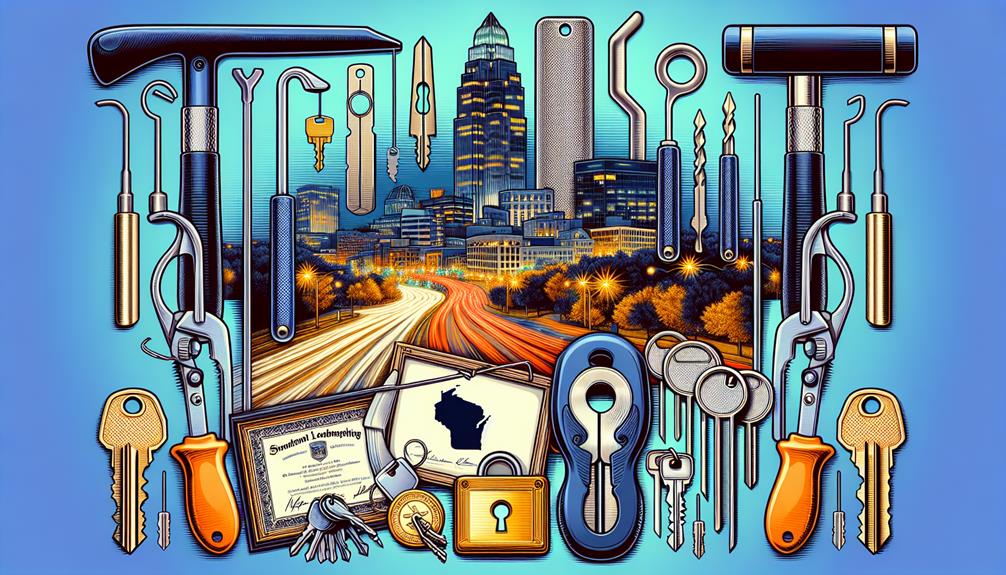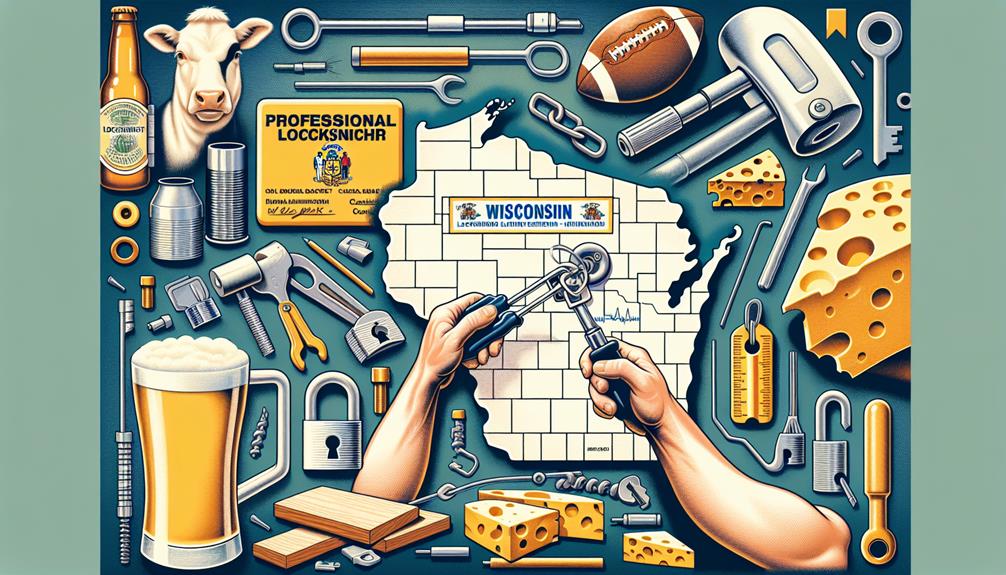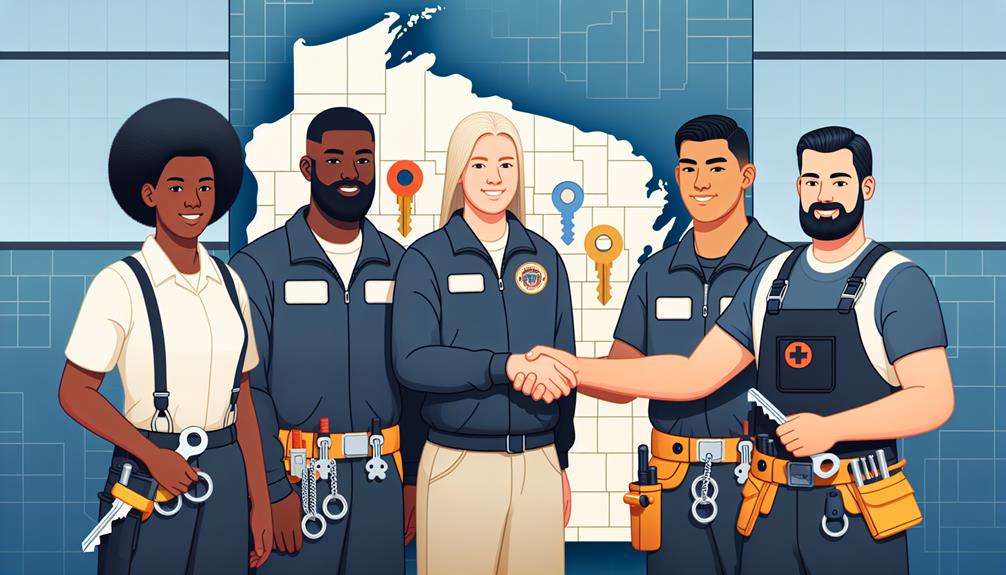As a locksmith in Wisconsin, you hold the keys to not just doors, but to a career that combines the art of precision with the satisfaction of problem-solving. You’re standing at the threshold, and the path to mastering this skill is less daunting than you might think.
In Wisconsin, locksmiths aren’t shackled by stringent state licensing, but local ordinances could dictate the level of credentialing you’ll need. You’re curious about what it takes to start, from the training that sharpens your abilities to the salary that rewards your efforts.
As a potential craftsman in the world of tumblers and keys, you’ll want to know about the opportunities and challenges that come with this line of work. Let’s explore how you can turn your interest into a profession, and why the demand for security might make this the perfect time to pursue a career as a locksmith.
Key Takeaways
- Becoming a locksmith in Wisconsin does not require a special locksmith license, but compliance with business operation rules is necessary.
- Locksmiths in Wisconsin can either work for local locksmith companies or start their own businesses.
- Locksmith training can be obtained through trade schools, online courses, or apprenticeship under an experienced locksmith.
- Continuing education is important for locksmiths to stay updated on the latest security hardware developments and technologies.
Locksmith Industry Overview

One must appreciate that the locksmith industry in Wisconsin involves skilled professionals who specialize in creating keys, repairing, and installing various types of locks and security systems. If you’re considering starting a locksmith business, you’ll find it doesn’t require a large upfront investment, but there are significant challenges in the locksmith market.
Competition is fierce, and establishing a reputable presence is crucial. You won’t need a specific locksmith license in Wisconsin, yet you must comply with business operation rules, which include acquiring a state-issued business license or one from city hall. To thrive, you should be at least 18 years of age, possess a sound mind, and have a clean moral background.
Your mechanical aptitude, mathematical skills, and proficiency with locksmith tools set the foundation of your expertise. Remember, overcoming the initial hurdle of finding customers is paramount. In a competitive market, a robust online presence, SEO strategies, and targeted advertising can be effective in attracting clients. These elements are integral to your business’s success, given the evolving nature of security systems and the constant need for innovative solutions.
Training and Education

Typically, starting your journey as a locksmith in Wisconsin involves enrolling in a training program that provides both theoretical knowledge and practical skills. You’ll find that the right education is crucial in setting yourself apart in the marketplace. Prospective locksmiths in Wisconsin have various training options to choose from, each designed to cater to different learning styles and schedules.
Here’s a concise table summarizing key aspects of locksmith training:
| Training Type | Duration | Benefits |
|---|---|---|
| Online Courses | Flexible | Study at your own pace, balance with other commitments |
| Apprenticeship | 1-2 years | Hands-on experience, mentorship from professionals |
| Trade Schools | Varies | Structured learning, comprehensive curriculum |
Certification benefits are manifold; they not only boost your credibility but also enhance your employability. By demonstrating a commitment to your craft through certified training, you position yourself as a knowledgeable and trustworthy professional, which is critical in a security-focused industry. Remember, while formal education might not be mandated by state law, the value of a solid educational foundation cannot be overstated when it comes to building a successful career as a locksmith.
Licensing Requirements

While Wisconsin doesn’t mandate a specific locksmith license, it’s vital to familiarize yourself with the business operation rules and regulations to ensure compliance when starting your locksmith career. You’ll need to adhere to state and local licensing regulations that apply to operating any business. In many cases, this means obtaining a state-issued business license or a license from your local City Hall. It’s crucial to comply with these requirements to avoid legal pitfalls and establish a reputable business.
Despite the lack of a state locksmithing license, you can still distinguish yourself in the market through professional certifications. These aren’t compulsory but can enhance your credibility and expertise. Organizations such as the Associated Locksmiths of America (ALOA) offer various levels of certifications, including Certified Registered Locksmith (CRL), Certified Professional Locksmith (CPL), and Certified Master Locksmith (CML).
Pursuing these certifications demonstrates a commitment to your craft and provides assurance to clients that you possess a vetted level of skill and knowledge.
Wisconsin Locksmith Licensing and Regulations
We’re now shifting our focus to Wisconsin’s locksmith licensing and regulations, and it’s essential to note that the state currently doesn’t require locksmiths to be licensed. This gives you the freedom to explore various Wisconsin locksmith training options without worrying about stringent locksmith certification requirements in Wisconsin.
However, consider the following to enhance your credibility:
- Voluntary certification: It demonstrates your skill level and commitment to the trade.
- Joining a trade association: It provides access to ongoing training, industry updates, and networking opportunities.
- Continued education: Keeping up with emerging technologies in security can set you apart.
- Ethical business practice: Despite lack of regulation, a solid reputation is vital for success.
Employment Opportunities

Having familiarized yourself with the necessary certifications and business regulations, it’s time to explore the various employment opportunities available for locksmiths in Wisconsin. The state offers a variety of job prospects in both urban and rural settings, catering to different levels of expertise and specialization.
Here’s a structured breakdown of where you might find your niche:
- Residential and Commercial Services:
- Local locksmith shops seeking skilled technicians
- Security companies integrating smart home systems
- Facilities maintenance departments for institutions and corporations
- Specialized Fields:
- Automotive locksmithing with dealerships or independent service centers
- Safe and vault work for banks and financial institutions
- Forensic locksmithing, working with law enforcement or security firms
- Entrepreneurial Ventures:
- Starting your own locksmith business
- Mobile locksmith services targeting emergency lockouts
- Consultancy services for security system installation and maintenance
Your career advancement as a locksmith in Wisconsin is substantially tied to continuous learning and adapting to technological changes in the security industry. By staying ahead with the latest locking mechanisms and security solutions, you can solidify your reputation and expand your service offerings, leading to a thriving career with robust demand for your expertise.
Salary Expectations

As you consider a career as a locksmith in Wisconsin, it’s essential to understand that your potential earnings can vary widely based on factors such as location, experience, and the type of services you offer.
The salary outlook for locksmiths in the state is generally positive, with the average annual salary ranging from around $37,795 on the lower end to $60,160 on the higher end. Entry-level positions typically offer approximately $29 per hour, reflecting the demand for skilled security professionals.
Your job prospects as a locksmith are influenced by the region in which you operate. Larger, more populous cities like Milwaukee, Madison, and Green Bay may present more opportunities and higher pay scales owing to a greater need for security services. However, this can also mean increased competition.
In more rural areas, the demand may be lower, but a well-established reputation can secure you a consistent client base.
It’s important to note that continuous education and specialization in areas such as electronic security systems can enhance your job prospects and potential earnings. As you gain experience and build a trustworthy reputation, your salary can increase accordingly. Remember, your success in this trade hinges on staying current with industry trends and maintaining a high level of service.
Frequently Asked Questions
What Are Some Common Challenges Faced by New Locksmiths in Establishing Their Reputation in the Local Wisconsin Market?
As a new locksmith, you’ll face market competition from established businesses, making it tough to stand out. You’ll need savvy advertising strategies to build your reputation in Wisconsin.
Harness social media, local SEO, and word-of-mouth referrals to reach potential clients. It’s crucial to demonstrate reliability and expertise quickly to gain trust and create a loyal customer base in the community.
Your success hinges on your visibility and service quality.
How Does One Stay Updated on the Latest Security and Lock Technologies as a Practicing Locksmith in Wisconsin?
To stay abreast of the latest in security and locks, you should attend locksmith conventions and security expos regularly.
These events are hubs for innovation, showcasing new technologies and techniques. They offer workshops and seminars where you can learn from industry leaders and network with peers.
Are There Specific Insurance or Bonding Requirements for Locksmiths Operating in Wisconsin?
Navigating the labyrinth of legalities, you’ll find that Wisconsin doesn’t mandate specific insurance policies or bonding for locksmiths. However, it’s wise to safeguard your business with proper coverage.
Aligning with reputable insurance providers and bonding agencies can protect against potential claims and build trust with clients.
It’s not just about keys and locks; it’s securing your professional future with a safety net of financial prudence and credibility.
What Are the Ethical Considerations and Privacy Laws That Locksmiths in Wisconsin Must Be Aware of When Handling Sensitive Customer Information?
You must prioritize client confidentiality and adhere to data protection laws. Handling sensitive customer information requires a solid ethical framework. You’re tasked with safeguarding personal details from misuse or unauthorized access.
It’s crucial to stay updated on privacy regulations to avoid legal pitfalls. Ethically, respecting clients’ privacy is paramount; legally, it’s non-negotiable.
Always act responsibly and ensure secure data handling procedures are in place in your locksmith practice.
How Can a Locksmith in Wisconsin Expand Their Services Beyond Traditional Lock and Key Solutions to Cater to the Growing Smart Home and Electronic Security Market?
To expand your services, you’ll want to dive into smart locks and access control systems. Start by getting trained in the latest electronic security tech.
Then, you can offer installations and maintenance for smart home systems. You’ve got to stay ahead of trends, ensuring you’re the go-to expert for both traditional locksmithing and modern security solutions.
This move will set you apart and cater to the tech-savvy customer base.








